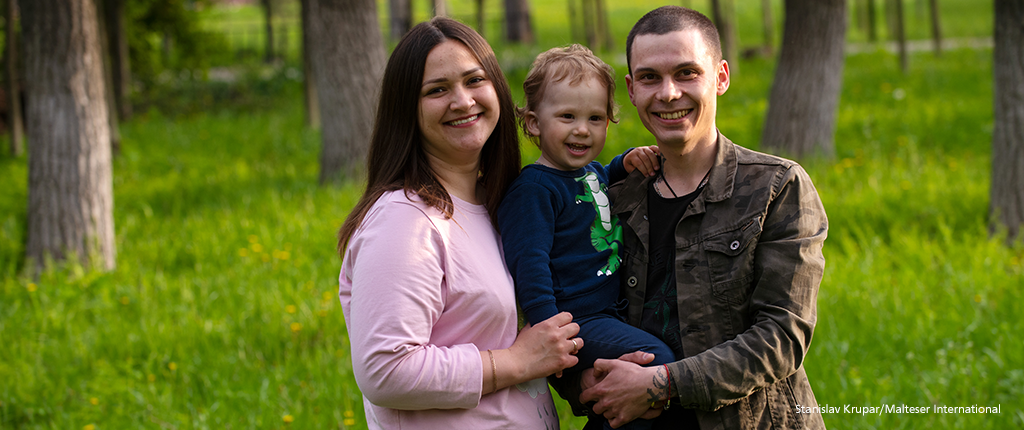
"All that was in my mind was the war."
A story by Andrea Jeska.
It was mandarines with which he won her heart. She only knew the man who had sent them to her over Facebook. They had a few mutual friends and started writing to each other. At some point she had mentioned that she liked mandarins. Then one day, a messenger arrived at her workplace and delivered to her a 30 kilo box filled with that fruit. Later she found out that these mandarins had cost him half his monthly salary.
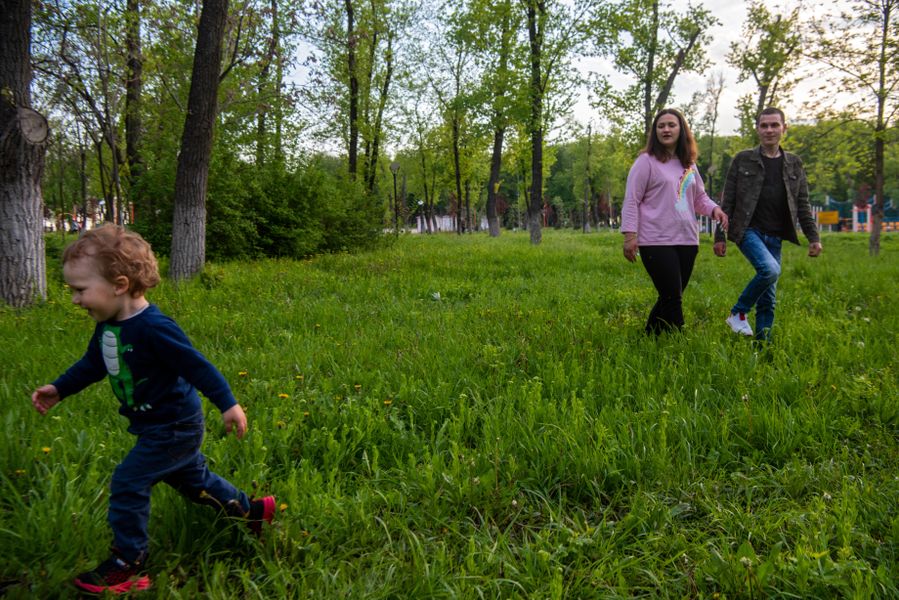
The mandarins were the beginning of a love story in which only few moments were to be reserved for romance. There was hardly any time for light-heartedness or room for creating memories together. Ekaterina, called Katya, and Alexander, called Sasha, from the eastern Ukrainian town of Pokrovsk found each other when a war that had been going on for four years lay like grey dust on people's souls. A war that had displaced 1.5 million people, in which 13,000 had died and in which even today, seven years since it began, people are killed every week by snipers, by shells and mines. A war that has long been forgotten in Western Europe because of, violence only being sporadic, the standing points being deadlocked anyways and because of the distance- Eastern Ukraine is far away. Within the international sphere, one speaks of a "frozen conflict". But for those who live with it, this war feels as present as an everlasting shadow. No matter what one does, no matter where one flees.
They got married a year after they met. Katja, dark hair, big eyes, always ready for a laugh. Something warm and happy emanates from her. And Sascha, slender, serious and brooding, with melancholic eyes. They were still too young, she 20 years old, he 22. But he was already at the front to that time and with her being afraid that he might not come back. They took the chance. He was given a few days' leave for the wedding. She got pregnant, he called, she answered. They talked everyday but that was all. For months. They did not see each other. He only always said that he was fine, there was nothing else to tell.
When their son was born, he cancelled his contract and came home. She was very happy, he had survived. Now they could finally be a family.
Of love in war
It's late spring in the city of Pokrovsk and every garden, park is blooming of red tulips, a true sea of shining petals. Next to the many chestnut trees and elms that line the streets, they are almost the most beautiful thing about the city. In Jubilejnii Park in the centre of the city, families walk their children, holding pink candy floss and balloons in their hands, the ice cream stalls are crowded and joggers run along the paths. Katja, Sascha and their now two-year-old son Zachar are playing on a meadow. The little one is fast and adventurous, time and again he escapes from his parents, blows the spores off the dandelions and runs slalom around the trees. Katja and Sascha take turns chasing him, finally dropping exhausted into the grass with him. Anyone watching them can see three happy people.
Katja: Just a few months ago, such an excursion would not have been possible.
Sascha: I couldn't be around people. It scared me.
Katja: You couldn't even ride a bus.
Sascha: The war was occupying my head. I couldn't do anything related to everyday life or see other people. It was enemies for me everywhere.
Katja: Also me and our child.
If a love story is also a war story, then it is about love in war times. Or about a war in love. For Katja and Sascha it was first the one thing, then the other. Sascha's return did not bring the happiness they had hoped for. He was alive, yes, unharmed, yes but only on the outside.
Katja: He was a stranger to me.
Sascha: I was a stranger to myself.
Katja: You didn't talk. At night you were screaming in your sleep.
Sascha: I couldn't find a job. We hardly had any money. I still felt like a soldier at the front: without any meaning, without any sense of belonging.
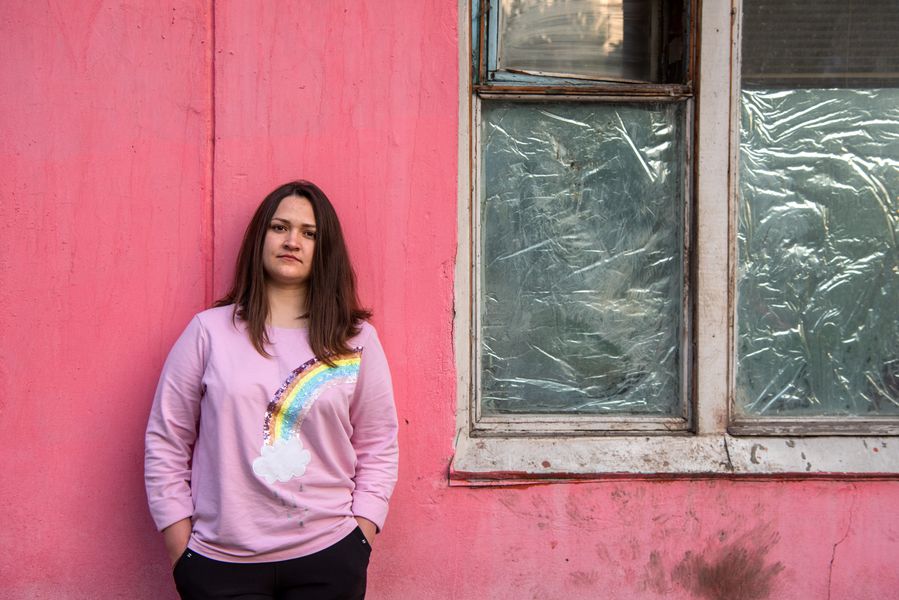
At one point, Sascha got aggressive, impatient and loud. She asked him to get help. He refused. So she decided to go alone to a psychologist and get everything off her chest. How overwhelmed and lonely she was: the baby, the financial worries and a strange, silent man. He, who seemed surrounded by ghosts, couldn’t leave the war behind and hence, brought it into her life. It scared her. She too talked about her parents, who stand with the separatists, and whom she could no longer freely talk to without fighting. About whether the Donbass region of eastern Ukraine, should better belong to Russia or not. Her Sasha is a convinced Ukrainian and she herself too wants to belong to the West.
Katja: It felt good to finallly speak it all off my chest. And to say that I simply can not do it, not alone.
Sascha: I couldn't do it at that time. I had no words for my feelings.
We meet Katja when she has one of her therapy sessions. Somewhere in Pokrovsk is a building where Malteser International offers psychosocial support for "those affected by the conflict in the Ukraine". For children with nightmares and panic attacks, soldiers with post-traumatic stress, suicidal thoughts, women with depression whose husbands take out on them their helplessness, unemployment, their war memories and their anger. The curve of domestic violence and also sexual abuse has risen dramatically since the beginning of the war. Add to that alcohol, drug and gambling addiction, unemployment and poverty. Even if life in Pokrovsk feels reasonably safe, the perception is that it is not. Most of those who seek psychological help have fled the war zones, have lost their homes and often enough their relatives. Mortar shells no longer fall on Pokrovsk, but the city, gateway to the Donbass, will always stay at the third line of defence. This means that if the Russian military were to invade, Pokrovsk would be affected too.
The conflict is not only at the front it also runs through the families. Some are pro-Russian, others pro-Ukrainian, some glorify the Soviet Union, others want to belong to the EU. For some, the separatists are criminals, for others, heroes. And the danger is always present. A phrase often uttered: "The Russians and the separatists are not here, but they could be here any day,". Because of these political ideologies, marriages have been broken up and parents have turned away from their own children.
Our support in the Ukraine
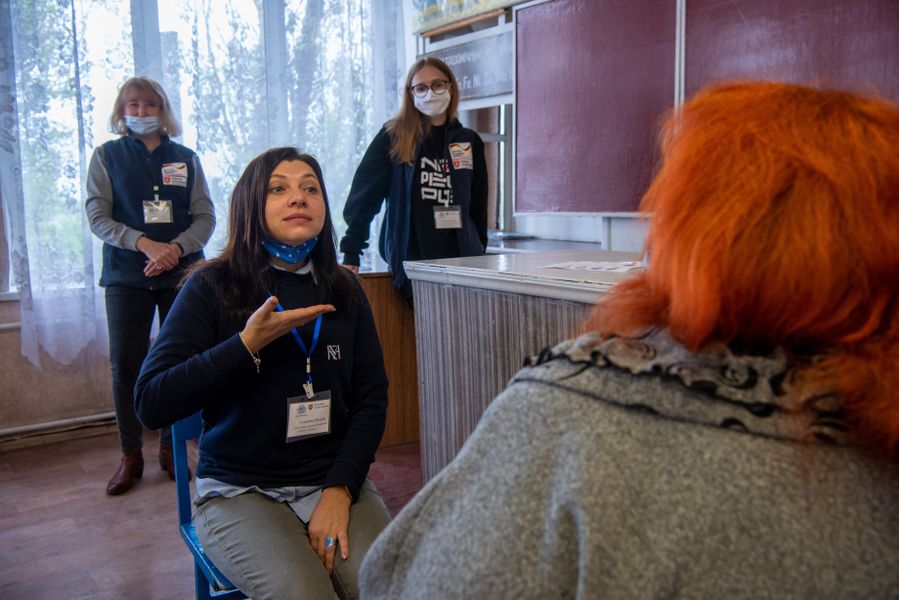
The Malteser psycho-social project has existed since 2015 and employs 10 psychological specialists. Every year 250 to 300 people go there to get support, most of them through behavioural therapy. The youngest patient was a two year old, the oldest an 80 year old. "After just three months of therapy 89 per cent of our patients feel able to cope with everyday life again and are ready to solve their problems," says the centre's director, Viktoria Solovyova. "The others we refer to further psychotherapists."
For almost a year, Sascha refused to accept help. And then one evening he made the step and said: “Well, let's go to the therapist. Together.“
Sascha: I understood that something was wrong with me and that I was hurting my family. I couldn't control my aggressions.
Katja: I couldn't help you, I have not been at the front. I had no idea what it was like.
Sascha: I was so lonely because there was no one to share my experiences with.
Katja: When Sascha was at the front, I read "Nothing New in the West" by Erich Maria Remarque. In order to understand what Sascha was going through. The book scared me, but it at the same time brought me closer to my beloved Sascha.
Sascha: The war was much worse than I imagined. I thought I was prepared, but in reality it turned out to be completely different.
It is hard for Katja and Sascha to bear with the constant threat of war.
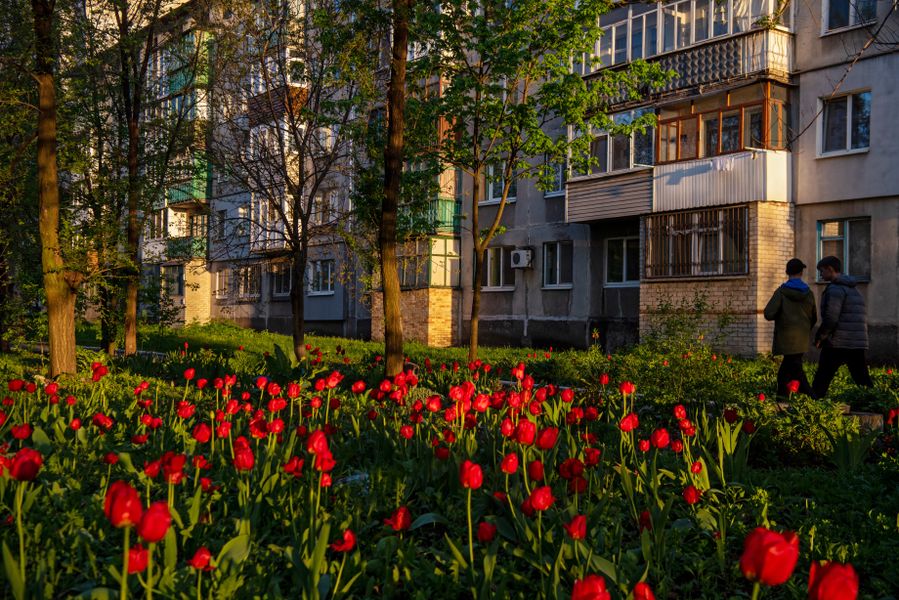
In 1991, when the Ukraine became independent Katja and Sascha were not yet born. Sasha spent his childhood and youth in the west of the country, in the town of Vinitsa, 800 kilometres from Pokrovsk, and Katya in Donetsk, close to the Russian border. When the separatists captured the town in 2014, Katya and her family had to flee. They found a new home in Pokrovsk. Katya finished school there and started working as a bank clerk. For Sasha in Winitsa, the war was not a reality, only headlines in the media. He had a patriotic friend who kept telling him that the Ukraine had to be defended. That friend caused Sasha to volunteer and he was transferred to the east, to the port city of Mariupol. What exactly was haunting him in his sleeps, he wouldn‘t tell. No, he did not see any soldier die. Still, death was present. With every mortar shell, with every rapid fire.
It was no surprise to Sascha that he got diagnosed with a post-traumatic stress syndrome. He had seen these conditions in other soldiers. The panic attacks out of the blue. The sudden rage. The lack of energy and kindness. He had seen men's lives fall apart.
Sascha: I didn't want that. There was my wife waiting for me, there was my child. Isn’t there more sense to being a father. What is a soldier? In the end, a lonely man in a lonely battle.
Would he allow himself to be recruited again. Without any hesitation: "Yes. It was right to defend Ukraine, to fight for freedom. But at the same time it is also right to stop."
The day comes to an end. Sascha and Katya show us the apartment building they live in. The façade is crumbling, the balcony crooked. They only get the most necessary repaired, they want to leave Pokrovsk and move to Sasha's home in Winitsa. But life is expensive there, the rents much higher. On the other hand, they believe they will no longer be able to bear the constant threat of war. "There is always this question in your head: what if...? We always have all our documents prepared, a packed emergency kit and a car filled with petrol," Katja tells us.
With their dreams far away they can at last be a family.
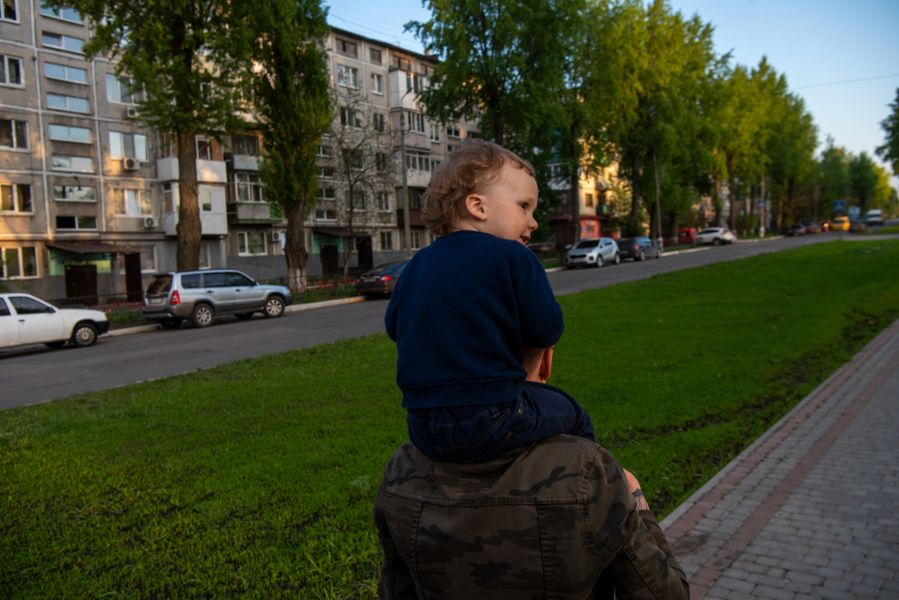
Katja wants to go for a walk at dusk. Zachar slept late at noon and is wide awake, now. As the sun sets over Pokrovsk, the streets fill up with young people. Sitting on benches with coffee-to-go cups in their hands, they give the impression of a very normal youth in a very normal country. Only the alcoholics, the people shuffling along the pavement, muttering to themselves, show that the price for the normality of some is the madness of others. "It is impossible to always live in a state of emergency," says Katja. Since Sascha has been in therapy and is no longer afraid of other people, he wants to catch up on what he missed, so they are on the road a lot. "Focusing on the family and the little things,day-to-day, makes us strong."
We stop at a playground. Zachar is about to play in the sandbox, Sascha and Katja snuggle up on a bench. Do people who live in a war zone start to define themselves by war? Or do they remain unchanged deep down?
Katja: I used to love reading Russian literature. Tolstoy, Akhmatova, Lermontov. Now I can't anymore, even though Russian is the language I grew up with, and the language I still speak.
Sascha: The war changed me.
What kind of life would you live if the war didn't exist?
Sascha: I always wanted to be a cosmonaut. But it wouldn‘t have happened anyways.
Katja: I always wanted to travel, to see the whole world. But one day we will. Me, Sascha and the little one.








